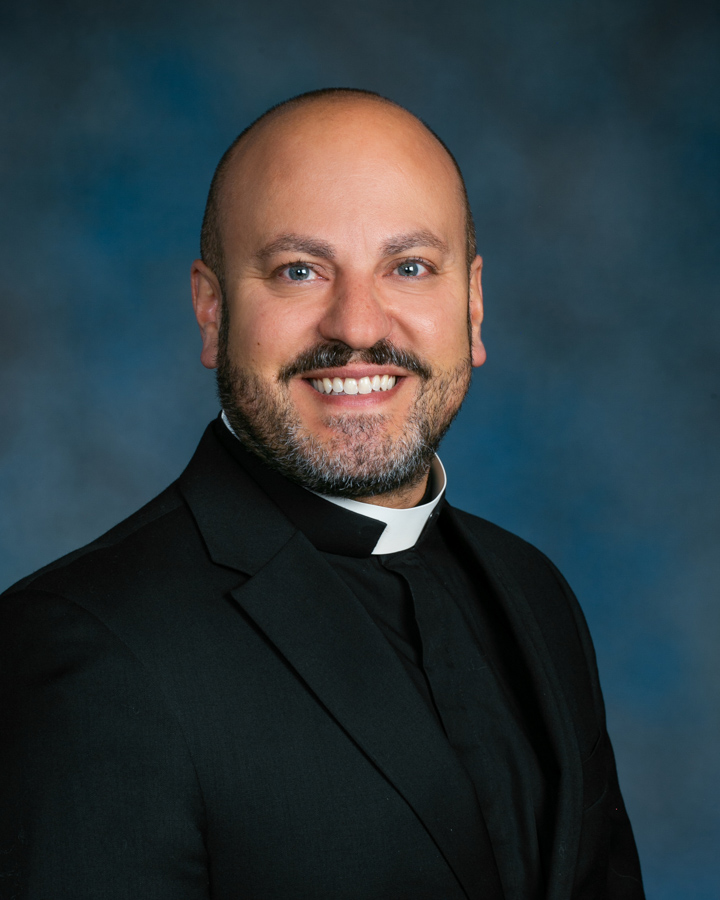
2/1/2026
4th Sunday of Ordinary Time, Year A, Year A / 4o Domingo de Tiempo Ordinario, Año A
1/25/2026
3rd Sunday of Ordinary Time, Year A, Year A / 3o Domingo de Tiempo Ordinario, Año A
1/18/2026
2nd Sunday of Ordinary Time, Year A, Year A / 2o Domingo de Tiempo Ordinario, Año A
1/11/2026
Baptism of the Lord, Year A / Fiesta del Bautismo del Señor, Año A
12/24/2025
Vigil of the Nativity of Our Lord, Year A / Vigilia de la Natividad del Señor
12/21/2025
Fourth Sunday of Advent, Year A /
IV Domingo de Adviento, Año A
12/14/2025
Third Sunday of Advent, Year A /
Tercero Domingo de Adviento, Año A
12/12/2025
Nuestra Señora de Guadalupe
12/8/2025
Solemnity of the Immaculate Conception, Year A /
Solemnidad de la Inmaculada Concepción de la Santísima Virgen María, Año A
12/7/2025
Second Sunday of Advent, Year A /
Segundo Domingo de Adviento, Año A
11/30/2025
First Sunday of Advent, Year A /
Primer Domingo de Adviento, Año A
11/23/2025
Solemnity of Our Lord Jesus Christ, King of the Universe, Year C /
Solemnidad de Nuestro Señor Jesucristo, Rey del Universo
11/16/2025
Thirty-third Sunday in Ordinary Time, Year C /
XXXIII Domingo Ordinario, Año C
11/9/2025
The Dedication of the Basilica of St. John Lateran, Year C /
Fiesta de la Dedicación de la Basílica de Letrán, Año C
11/2/2025
The Commemoration of All the Faithful Departed
(All Souls) /
Conmemoración de Todos los Fieles Difuntos
10/26/2025
Thirtieth Sunday in Ordinary Time /
XXX Domingo Ordinario
This homily has important information
Esta homilía tiene información importante.
6/9/2024
10th Sunday of Ordinary Time, Year B/10 Domingo de Tiempo Ordinario, Año B
“Where are you?”
CCC 1864 “Whoever blasphemes against the Holy Spirit never has forgiveness, but is guilty of an eternal sin.” There are no limits to the mercy of God, but anyone who deliberately refuses to accept his mercy by repenting, rejects the forgiveness of his sins and the salvation offered by the Holy Spirit.
The five precepts of the Catholic Church are:
- Attend Mass on Sundays and days of obligation.
- Confess your sins at least once a year.
- Receive the Eucharist at least once a year.
- Observe days of fasting and abstinence.
- Provide for the needs of the Church.
Such hardness of heart can lead to final impenitence and eternal loss.
“Donde Estás?”
CCC 1864 “Quien blasfema contra el Espíritu Santo nunca tiene perdón, sino que es culpable de un pecado eterno”. No hay límites para la misericordia de Dios, pero quien deliberadamente se niega a aceptar su misericordia arrepintiéndose, rechaza el perdón de sus pecados y la salvación ofrecida por el Espíritu Santo. Tal dureza de corazón puede conducir a la impenitencia final y a la pérdida eterna.
Los cinco preceptos de la Iglesia Católica son:
1. Asistir a Misa los domingos y días de precepto.
2. Confiesa tus pecados al menos una vez al año.
3. Recibir la Eucaristía al menos una vez al año.
4. Observar días de ayuno y abstinencia.
5. Proveer para las necesidades de la Iglesia.
This homily has important information
Esta homilía tiene información importante.
6/2/2024
Solemnity of the Body & Blood of Christ, Year B/Solemnidad del Sagrado Cuerpo y Sangre de Cristo, Año B
Blood is life, but the blood of Jesus gives us life eternal!
Click to read about
The Eucharistic Miracles of the World
Homilía en Español
Haga clic a leer sobre
Los Milagros Eucarísticos en el Mundo
Haga clic a leer sobre
San Justino Mártir y la Eucaristía
This homily has important information about marriage and separation.
Esta homilía tiene información importante sobre el matrimonio y la separación.
9/17/2023
24th Sunday of Ordinary Time, Year A/24th Domingo de Tiempo Ordinario, Año A
Forgiveness is not permission, but it’s the only path to healing and true freedom!
CATECHISM OF THE CATHOLIC CHURCH
2383 The separation of spouses while maintaining the marriage bond can be legitimate in certain cases provided for by canon law.
If civil divorce remains the only possible way of ensuring certain legal rights, the care of the children, or the protection of inheritance, it can be tolerated and does not constitute a moral offense.
CODE OF CANON LAW
SEPARATION WITH THE BOND REMAINING
Can. 1151 Spouses have the duty and right to preserve conjugal living unless a legitimate cause excuses them.
Can. 1152 §1. Although it is earnestly recommended that a spouse, moved by Christian charity and concerned for the good of the family, not refuse forgiveness to an adulterous partner and not disrupt conjugal life, nevertheless, if the spouse did not condone the fault of the other expressly or tacitly, the spouse has the right to sever conjugal living unless the spouse consented to the adultery, gave cause for it, or also committed adultery.
§2. Tacit condonation exists if the innocent spouse has had marital relations voluntarily with the other spouse after having become certain of the adultery. It is presumed, moreover, if the spouse observed conjugal living for six months and did not make recourse to the ecclesiastical or civil authority.
§3. If the innocent spouse has severed conjugal living voluntarily, the spouse is to introduce a cause for separation within six months to the competent ecclesiastical authority which, after having investigated all the circumstances, is to consider carefully whether the innocent spouse can be moved to forgive the fault and not to prolong the separation permanently.
Can. 1153 §1. If either of the spouses causes grave mental or physical danger to the other spouse or to the offspring or otherwise renders common life too difficult, that spouse gives the other a legitimate cause for leaving, either by decree of the local ordinary or even on his or her own authority if there is danger in delay.
§2. In all cases, when the cause for the separation ceases, conjugal living must be restored unless ecclesiastical authority has established otherwise.
Can. 1154 After the separation of the spouses has taken place, the adequate support and education of the children must always be suitably provided.
Can. 1155 The innocent spouse laudably can readmit the other spouse to conjugal life; in this case the innocent spouse renounces the right to separate.
Perdonar NO es dar permiso, pero si es necesario para nuestra salvación!






